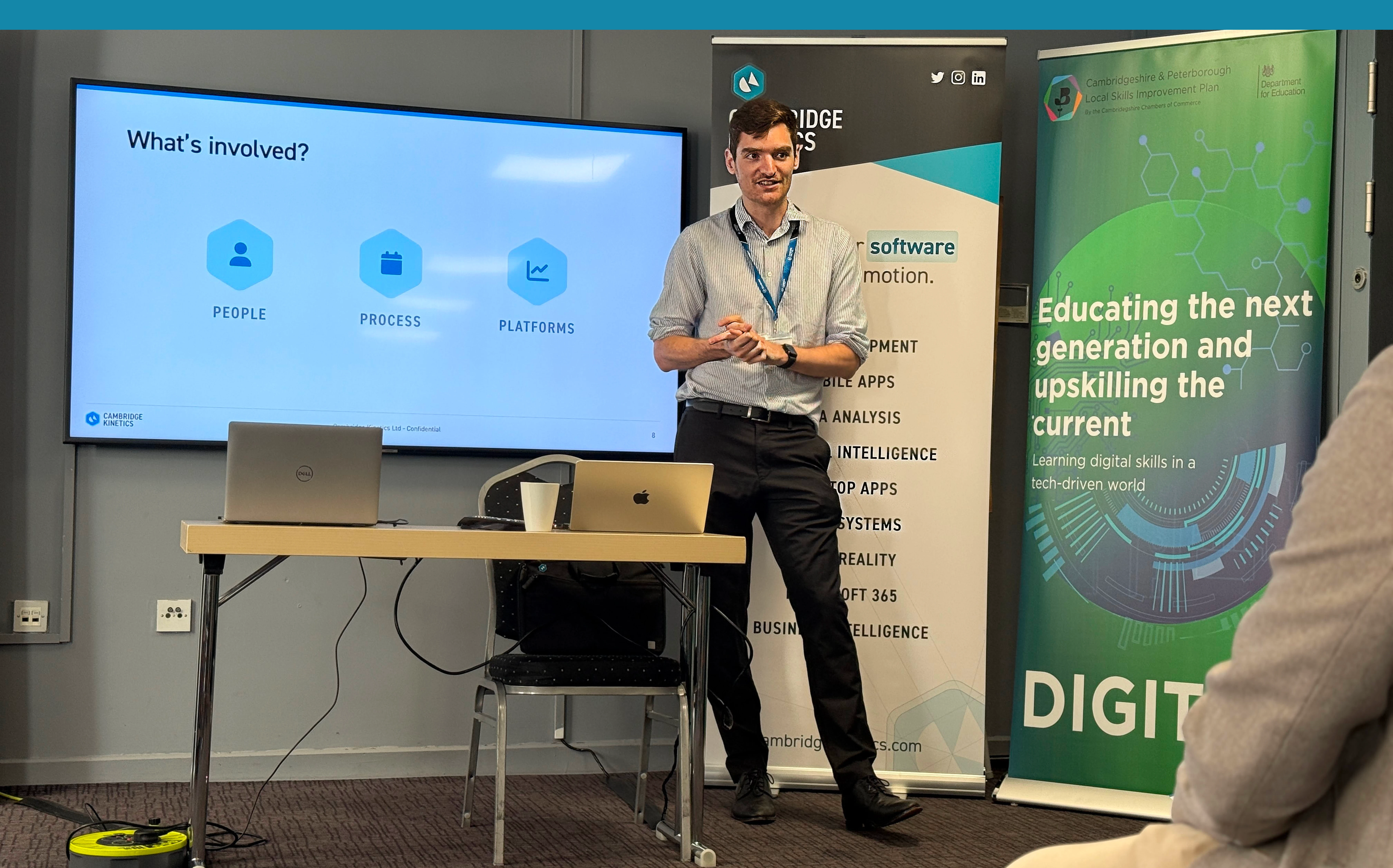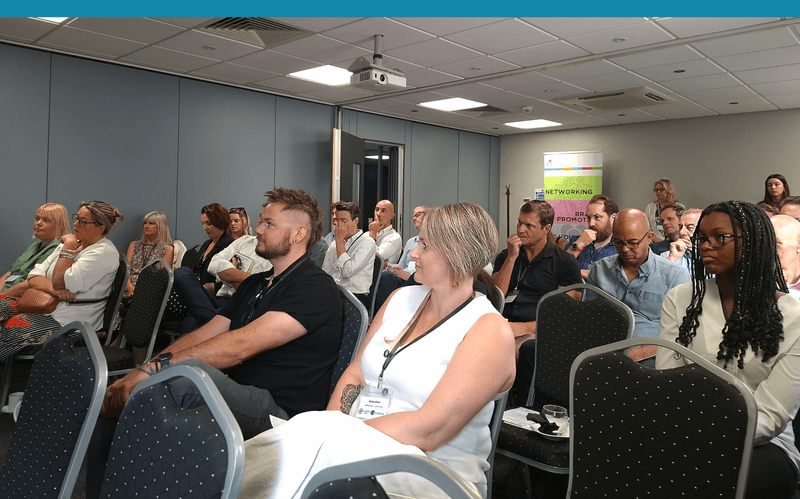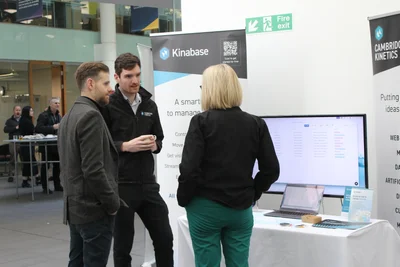
Driving Businesses Forward Through Digital Transformation
On Wednesday 13th August, the Cambridgeshire Chambers of Commerce event was buzzing with energy, packed with around 60 business leaders, innovators and professionals eager to learn how to harness the power of digital transformation. The room was full of note-takers, nods of agreement, and those “lightbulb moments” that happen when a speaker hits on something that resonates deeply.
The session was delivered by our Founder and Managing Director, Jason Mashinchi, a newly appointed Board Director of the Chamber, who brought both credibility and enthusiasm to the stage. His talk, “Driving Business Forward Through Digital Transformation”, went far beyond industry buzzwords. It was a practical, experience-rich exploration of how SMEs can unlock real, measurable value through smarter use of technology and how AI is reshaping the competitive landscape.
Breaking Down Digital Transformation
Jason opened by challenging the misconception that digital transformation is simply about “going paperless” or adopting the latest trendy software. Instead, he defined it as boosting efficiency, improving quality, and achieving cost savings by using digital tools more effectively. For many SMEs, that means moving beyond spreadsheet-based processes and legacy systems towards modern, AI-native solutions that can adapt as the business evolves.
The pace of change, Jason warned, is unprecedented. Old assumptions about software, technology, and even business models no longer hold true. Companies that fail to adapt risk being left behind, not because they lack opportunity, but because they’re not capitalising on the data and tools already available to them.
The Barriers and the Mindset Shift
One of the recurring themes in Jason’s talk was that digital transformation is as much about people as it is about technology.
Resistance to change, lack of digital confidence, and underestimating existing resources are common barriers. Jason encouraged businesses to upskill their teams, make tools approachable and start with small, low-risk steps. He also debunked some of the most common myths that stop SMEs from acting:
- “We lack expertise” – Modern AI tools enable non-engineers to build systems and understand data.
- “It’s too expensive” – Start small – ROI from efficiency gains often funds itself.
- “Our data isn’t good enough” – Most businesses already have usable data hidden in CRMs, spreadsheets, or operational logs.
- “It will disrupt our workforce” – AI is about augmentation, not replacement. This frees people from repetitive tasks so they can focus on high-value work.
Data: The Heart of the Transformation
A key point in Jason’s presentation was that data is the fuel that powers digital transformation. Without it, AI and automation are ineffective, the notion of “Rubbish in,
Rubbish out”. He urges businesses to consolidate data from across departments; sales, marketing, purchasing, operations into a single source of truth, cutting duplication and simplifying entry.
Jason illustrated the potential with an exciting vision: imagine being able to ask your system, in plain English, “How are sales performing compared to last quarter?” and instantly receiving a dashboard of charts and insights. That’s where integrated, AI-ready systems are taking us.
Real-World Examples: Transformation in Action
Jason brought about three powerful case studies from Kinabase’s work:
- Education & Leadership Sector – Moving from inefficient, fragmented workflows to a fully integrated system reduced repetitive tasks through automation, streamlined file management, and consolidated data across five departments.
- Furniture Manufacturing – Transitioning from spreadsheets and email chains to automated workflows and client portals not only saved over 10 hours per week, but also increased sales by improving accuracy, speeding up approvals, and enhancing customer visibility.
- Charity Sector – Overcoming four failed CRM implementations, this organisation adopted a tailored, easy-to-use solution that improved productivity, reduced admin, cut paper waste, and saved the cost of hiring an additional data entry role.
Each example reinforced Jason’s message: technology should work for you and not the other way around. Flexibility and a deep understanding of processes are essential for successful implementation.
AI: Raising the Bar for SME’s
Far from being a distant or niche innovation, AI is already delivering tangible benefits for SMEs. Jason explained that AI raises the bar for both quality and speed, helping smaller organisations punch above their weight.
From suggesting KPIs based on existing data to enabling agent-based workflows that handle repetitive tasks automatically, AI is evolving at breakneck speed. Early adopters are already seeing significant gains in efficiency, insight, and decision-making power.

The Human Factor: Leadership and Culture
One of Jason’s most memorable insights was that 70% of digital projects fail, and it’s rarely because of the technology. Success depends on people:
- Assign a dedicated champion for the project, so that they are the spearhead to see the project through.
- Give them the authority to challenge assumptions and engage across the team.
- Start with the ‘why’ to secure buy-in.
- Foster a learning culture where experimentation and iteration are encouraged.
By embedding these principles, SMEs can reduce the risk of failed initiatives and ensure lasting impact.
Practical Next Steps for Businesses
Jason closed his talk with a set of actionable steps for businesses wanting to start their own transformation journey:
- Map Your Processes – Document workflows end-to-end, question every step, and identify bottlenecks.
- Start Small – Choose one area where improvement is both achievable and measurable.
- Stay Informed – Technology is moving fast; keep an eye on emerging tools.
- Leverage Support – Tap into grants, university partnerships and tech company collaborations.
- Build a Learning Culture – Encourage experimentation and empower staff to contribute ideas.
The most important takeaway? Do something. Even a small pilot project can pave the way for larger, more ambitious changes.
Final Thoughts
Jason Mashinchi’s talk was more than just a presentation, it was a rallying cry for SMEs to seize the opportunities in front of them. The room’s engagement, the flurry of notes, and the post-event conversations all pointed to one conclusion: digital transformation is no longer optional, it’s a necessity.
By combining the right technology with empowered people, SMEs can not only keep pace with change but use it to leap ahead of their competitors. Whether through AI-driven analytics, streamlined workflows, or simply reducing duplication, the goal is the same: boost productivity, improve quality, and free up valuable time to focus on growth.
For those ready to take the first step, the message was clear. Act now. Start small. Keep learning.
Recent Articles

Safari Networking & Exhibition at Suffolk Chamber: Real Conversations and Connections at Milsoms Kesgrave Hall
Kinabase attended the Suffolk Chambers of Commerce Safari Networking & Exhibition at Milsoms Kesgrave Hall, building meaningful connections with local businesses through structured networking and live demos.

Automate Manufacturing Paperwork and Keep Production Flowing Smoothly
How manufacturers use Kinabase to remove friction from operations, production support, procurement, quality and finance through automations, workflows and integrations.

From Data to Insight in Seconds: How AI Chart Suggestions Transform Business Intelligence
Discover how Kinabase's AI Chart Suggestions help you visualise your data without needing to know what charts to create or how to configure them.